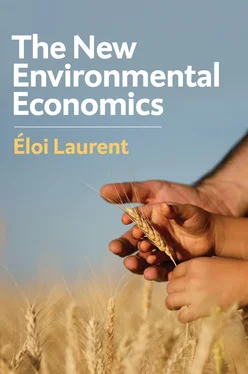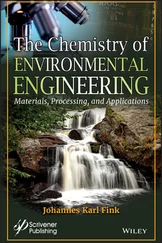Although each age saw progress, economics of the environment, like other disciplines, has very much been a process of cumulative knowledge. There is still much to learn from Pigou or Ronald Coase in order to design relevant climate mitigation policy, although they were unaware of climate change and their analyses were embedded in a now much discredited standard neo-classical vision of the economy. This is why this textbook is scientifically pluralist and does not exclude any insightful stream of knowledge on ideological grounds. But the following pages are guided by two strong imperatives: It is unreasonable (and empirically wrong) to dissociate humans from Nature and the economy from the biosphere that contains it (economics without the environment makes little sense in the twenty-first century); it is unconvincing and ethically dubious to reduce environmental economics to a science of efficiency that leaves aside distributional analysis and justice policy. In short, a fourth age of environmental economics is upon us and this textbook wants to introduce readers to it.
To put it simply, this textbook is different from existing ones because it attempts to bring together the insights of environmental economics (resource economics, externality economics) and ecological economics (sustainability economics) under the imperative of justice. Political economy of the environment is the disciplinary category that best fits this ambition. The two major crises of the early twenty-first century, the inequality crisis and ecological crises, demand to be studied jointly to be fully understood and possibly mitigated.
This academic line of work resonates with recent texts grounded in native culture (the “Cochabamba Declaration”), 2religious ethics (the encyclical Laudato Si ) and political thinking (“the Green New Deal” in the US or the promotion in the European Union of “sustainable equality”). In Laudato Si , published in June 2015, under the auspices of St. Francis of Assisi (friend of the poor and author of the Canticle of Brother Sun and Sister Moon, declared patron of ecologists by Pope John Paul II in 1979), Pope Francis writes: “We are faced not with two separate crises, one environmental and the other social, but rather with one complex crisis which is both social and environmental.” In the “Green New Deal” bill of February 2019, 3US Democratic representative Ocasio-Cortez and her colleagues identify “systemic injustices” (social and ecological) as the root cause of US ill-being and intend conversely to implement a “fair and just transition” benefiting in priority “frontline and vulnerable communities.”
Policy-makers in Europe are also advocating concrete proposals to advance the goals of “sustainable equality.” A report from the Progressive Alliance of Socialists and Democrats in the European Parliament, for example, acknowledges that “inequality is an environmental issue just as environmental degradation is also a social issue.” 4
Finally, Greta Thunberg, a fifteen-year-old climate activist at the time, made the social-ecological connection explicit when she declared: “our biosphere is being sacrificed so that rich people in countries like mine can live in luxury. It is the suffering of the many which pays for the luxuries of the few.” 5“Our civilization is being sacrificed for the opportunity of a very small number of people to continue making enormous amounts of money.”
By linking justice and sustainability in a “sustainability–justice nexus,” 6a number of scholars echoes these concerns and argues that our societies will be more just if they are more sustainable and more sustainable if they are more just. 7In the profound words of James Boyce: “economic activities that degrade the environment generally yield winners and losers. Without winners – people who derive net benefit from the activity, or at least think that they do – the environmentally degrading activities would not occur. Without losers – people who bear net costs – they would not matter in terms of human well-being.” 8
In the twenty-first century, it thus makes environmental sense to mitigate our social crisis and social sense to mitigate our environmental crises. We should worry about our fragile societies, weakened by inequality, facing unprecedented environmental shocks. We should be anxious about the potential explosion of injustice in the face of deteriorating ecological crises. 9To give life to these concerns and translate them into meaningful policies, justice needs to take back its place as an input and outcome of environmental economics.
Consider the issue of climate change. A handful of countries, ten percent exactly (and a handful of people and industries 10within these countries) are responsible for 80% of human greenhouse gas emissions, causing climate change that is increasingly destroying the well-being of a considerable part of humanity around the world, but mostly in poor and developing nations. On the other hand, the vast majority of the people most affected by climate change (in Africa and Asia), numbering in the billions, live in countries that represent almost nothing in terms of responsibility but are highly vulnerable to the disastrous consequences of climate change (heat waves, hurricanes, flooding) triggered by the lifestyle of others, thousands of miles away. Why is climate change still not mitigated and actually worsening before our eyes, while we have, as we will see in detail in this book, all the science, technology, economics, and policy tools we need to fix it? Largely because the most responsible are not the most vulnerable, and vice-versa. Climate justice is the key to understanding and eventually solving the urgent climate crisis. Climate justice is the solution to climate change.
What is true in space among countries is also true in time, between generations. Climate strikes and marches have taken place and grown in momentum in a number of countries around the globe in 2019 (on March 15, 2019, in 120 countries and 2,000 cities, hundreds of thousands of students strike to call on global leaders to act against climate change). Part of the new generation is now aware of the grave injustice it will suffer as a result of choices over which it has yet no power. But the recognition of this inter-generational inequality comes up against the wall of intra-generational inequality: The implementation of a true ecological transition cannot escape the social challenges of here and now; in particular the imperative of inequality reduction. The ecological transition will be social-ecological or it will not be. It will be just or just not be. This is why, to take just one example, when this book will explore the necessity of carbon taxation, it will also highlight the need for social compensation of the poorest households who are the hardest hit by energy price increases.
There are indeed two possible ways to connect the current inequality crisis with ecological crises. The first arrow of causality, which runs from inequality to environmental degradation, can be labelled “integrative social-ecology,” as it shows that the gap between the rich and the poor and the interaction of the two groups leads to the worsening of environmental degradations and ecological crises that affect every member of a given community (for example, greater international income inequality leads to more waste and pollutions being outsourced to poorer countries).
The reciprocal arrow of causality that goes from ecological crises to social injustice can be labelled “differential social-ecology,” as it shows that the social impact of ecological crises is not the same for different individuals and groups, given their socio-economic status (the most vulnerable socially are “ecological sentinels” in the sense that they are first and foremost affected by current ecological crises: the poor generally suffer the most from environmental degradations). In the words of the Brundtland Report: “As a system approaches ecological limits, inequalities sharpen. Thus, when a watershed deteriorates, poor farmers suffer more because they cannot afford the same anti-erosion measures as richer farmers. When urban air quality deteriorates, the poor, in their more vulnerable areas, suffer more health damage than the rich, who usually live in more pristine neighborhoods. When mineral resources become depleted, late-comers to the industrialization process lose the benefits of low-cost supplies.” 11
Читать дальше












